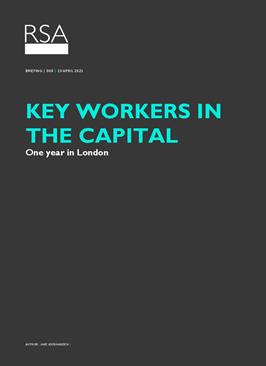Many of London’s key workers are economically insecure. They face financial precarity, growing housing costs, less time for their personal lives, and increased strain on their mental health.
Our findings show they need support to allow them to live comfortably among the communities they serve.
Our key findings and recommendations
- London’s key workers are split in their finances and their economic outlook. Some are comfortable and optimistic while others are struggling and pessimistic about the future.
- Ethnic minority key workers nationally (14% of all key workers are from an ethnic minority background), many of whom live in London, are especially pessimistic about their economic future.
- Despite the Greater London rental market prices falling by 6.4% in the year to the fourth quarter of 2020, 23% of London’s renting key workers say their rent has increased. This shows the differing rental markets of inner and outer London (where rental changes have held flat), but could also show that key workers in London have felt their other housing costs to increase too.
- Key workers in London are also the most generally dissatisfied with their housing situation when compared to other regions.
- London key workers have had to sacrifice their personal lives for their work to a greater extent than key workers in Great Britain as a whole. London’s key workers were consistently the most likely to say they have found ‘maintaining their work-life’ balance and ‘taking leave when they want’ more difficult as a result of the pandemic.
- London’s key workers are more likely to cite ‘money worries’ and the number of ‘people at work who have become very ill or died with coronavirus’ as drivers of poor mental health, compared to the rest of Great Britain.
- To help support key workers in the capital, the RSA is calling on the next Mayor of London to set a wider definition of ‘key worker’ when prioritising affordable housing, and promise to freeze Transport for London fares for key workers in the capital.
pdf 427.8 KB
Author

Related articles
-
Digital lifelong learning in France
Report
Veronica Mrvcic Aoife O'Doherty
Read the findings of our partnership with Bayes Impact, funded by the Mastercard Center for Inclusive Growth, as we supported the design and evaluation of their Jobflix platform.
-
Good Work Guild: inspiring the future of work
Blog
Adanna Shallowe
Learn about the twelve-month journey of The Good Work Guild and the recommendations its global network of Fellows and work practitioners have made.
-
Scaling digital lifelong learning innovations in the UK
Report
Mark Hall Veronica Mrvcic
This report outlines barriers preventing people from accessing UK lifelong learning opportunities and the drivers that could encourage impactful digital innovations.



